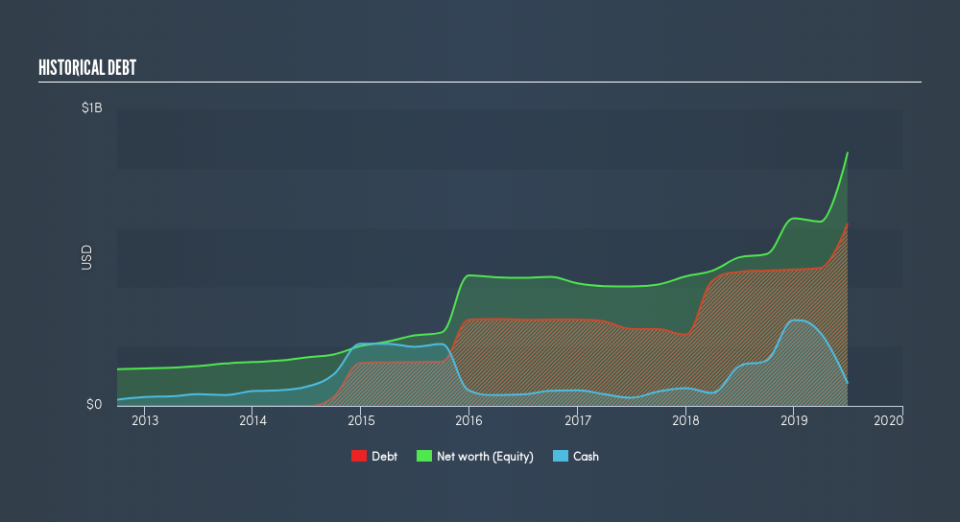Does Envestnet (NYSE:ENV) Have A Healthy Balance Sheet?

David Iben put it well when he said, 'Volatility is not a risk we care about. What we care about is avoiding the permanent loss of capital.' So it might be obvious that you need to consider debt, when you think about how risky any given stock is, because too much debt can sink a company. We can see that Envestnet, Inc. (NYSE:ENV) does use debt in its business. But is this debt a concern to shareholders?
When Is Debt Dangerous?
Debt assists a business until the business has trouble paying it off, either with new capital or with free cash flow. Ultimately, if the company can't fulfill its legal obligations to repay debt, shareholders could walk away with nothing. However, a more common (but still painful) scenario is that it has to raise new equity capital at a low price, thus permanently diluting shareholders. Having said that, the most common situation is where a company manages its debt reasonably well - and to its own advantage. The first step when considering a company's debt levels is to consider its cash and debt together.
Check out our latest analysis for Envestnet
What Is Envestnet's Debt?
As you can see below, at the end of June 2019, Envestnet had US$614.3m of debt, up from US$451.9m a year ago. Click the image for more detail. However, because it has a cash reserve of US$77.7m, its net debt is less, at about US$536.5m.
A Look At Envestnet's Liabilities
According to the last reported balance sheet, Envestnet had liabilities of US$353.5m due within 12 months, and liabilities of US$605.1m due beyond 12 months. Offsetting these obligations, it had cash of US$77.7m as well as receivables valued at US$79.9m due within 12 months. So its liabilities total US$800.9m more than the combination of its cash and short-term receivables.
This deficit isn't so bad because Envestnet is worth US$2.99b, and thus could probably raise enough capital to shore up its balance sheet, if the need arose. But we definitely want to keep our eyes open to indications that its debt is bringing too much risk.
We use two main ratios to inform us about debt levels relative to earnings. The first is net debt divided by earnings before interest, tax, depreciation, and amortization (EBITDA), while the second is how many times its earnings before interest and tax (EBIT) covers its interest expense (or its interest cover, for short). Thus we consider debt relative to earnings both with and without depreciation and amortization expenses.
Weak interest cover of 0.20 times and a disturbingly high net debt to EBITDA ratio of 6.7 hit our confidence in Envestnet like a one-two punch to the gut. This means we'd consider it to have a heavy debt load. Even worse, Envestnet saw its EBIT tank 54% over the last 12 months. If earnings keep going like that over the long term, it has a snowball's chance in hell of paying off that debt. When analysing debt levels, the balance sheet is the obvious place to start. But ultimately the future profitability of the business will decide if Envestnet can strengthen its balance sheet over time. So if you're focused on the future you can check out this free report showing analyst profit forecasts.
Finally, while the tax-man may adore accounting profits, lenders only accept cold hard cash. So we clearly need to look at whether that EBIT is leading to corresponding free cash flow. Happily for any shareholders, Envestnet actually produced more free cash flow than EBIT over the last three years. That sort of strong cash conversion gets us as excited as the crowd when the beat drops at a Daft Punk concert.
Our View
Envestnet's EBIT growth rate and interest cover definitely weigh on it, in our esteem. But the good news is it seems to be able to convert EBIT to free cash flow with ease. Taking the abovementioned factors together we do think Envestnet's debt poses some risks to the business. While that debt can boost returns, we think the company has enough leverage now. Given our hesitation about the stock, it would be good to know if Envestnet insiders have sold any shares recently. You click here to find out if insiders have sold recently.
At the end of the day, it's often better to focus on companies that are free from net debt. You can access our special list of such companies (all with a track record of profit growth). It's free.
We aim to bring you long-term focused research analysis driven by fundamental data. Note that our analysis may not factor in the latest price-sensitive company announcements or qualitative material.
If you spot an error that warrants correction, please contact the editor at editorial-team@simplywallst.com. This article by Simply Wall St is general in nature. It does not constitute a recommendation to buy or sell any stock, and does not take account of your objectives, or your financial situation. Simply Wall St has no position in the stocks mentioned. Thank you for reading.

